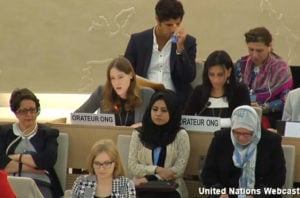
ICT’s Mélanie Blondelle delivering a statement at the UN Human Rights Council on behalf of the Helsinki Foundation for Human Rights (HFHR).
Earlier, on June 17, ICT had delivered an oral statement (see text below) on behalf of the Helsinki Foundation for Human Rights at the Human Rights Council session. The statement, which responded to the Report of the UN Special Rapporteur on the promotion and protection of the right to freedom of opinion and expression, David Kaye, was delivered by Mélanie Blondelle, Policy and Advocacy Officer at ICT’s office in Brussels.
The statement focused on the risks Tibetans face in expressing their views in an increasingly repressive environment (including a new emphasis on “counter-terror” and “stability maintenance” measures) in which almost any expression of Tibetan identity or culture can be characterized by the authorities as “splittist” and therefore “criminal”, as well as on the suppression of a wave of solo peaceful demonstrations in the area of Ngaba (Tibetan region in Sichuan province).
The statement also echoed the concerns raised by the United States earlier in the debate regarding the recently adopted Chinese law on counter-terrorism, which in conflating “terrorism” with an undefined religious “extremism”, gives scope for the penalization of almost any peaceful expression of Tibetan identity, acts of non-violent dissent, or criticism of ethnic or religious policies, and risks further curtailing freedom of expression in Tibet.
“We call upon the Human Rights Council, of which the People’s Republic of China is a member, to ensure the release of all those detained for the mere reason of having exercised their right to freedom of opinion and expression, and to urge China to allow independent observers access to Tibet to verify the extent of the violations to freedom of expression on the ground”, Blondelle said.
Text of statement by Mélanie Blondelle,
GENERAL ASSEMBLY
Human Rights Council
Thirty-second session
June 16, 2016
Item 3: Interactive Dialogue – Report of the Special Rapporteur on the promotion and protection of the right to freedom of opinion and expression
Statement delivered by Mélanie Blondelle on behalf of the Helsinki Foundation for Human Rights (HFHR)
Mr. President,
We wish to thank the Special Rapporteur Mr. David Kaye for his report.
Over the last few months, tightening repression in Tibet, including a new emphasis on “counter-terror” and “stability maintenance” measures, has created a more dangerous political environment for Tibetans in expressing their views.
As a result, a new generation of Tibetans are paying a high price for exercising their right to freedom of expression, in a political climate in which almost any expression of Tibetan identity or culture, no matter how mild, can be characterized by the authorities as “splittist” and therefore “criminal”.
One of them is the popular blogger Druklo, known more widely by his pen name Shokjang, who was sentenced on 17 February 2016 to three years in prison[1]. Details of charges are not known, but in the days leading up to his arrest, he had written a blog post about an intense build-up of Chinese security forces in the Rebkong area (Chinese: Tongren), Qinghai.
In the county town of Ngaba, Sichuan province, one of the most oppressive areas of Tibet, a wave of peaceful solo protests has also been severely suppressed[2]. The Tibetans who have held lone and non-violent demonstrations, calling for the return of the Dalai Lama to Tibet and freedom for Tibet, have been detained, and face severe torture in custody as well as a prison sentence of between two and four years.
The recently adopted Chinese law on counter-terrorism, which in conflating “terrorism” with an undefined religious “extremism” gives scope for the penalization of almost any peaceful expression of Tibetan identity, acts of non-violent dissent, or criticism of ethnic or religious policies, risks further curtailing freedom of expression in Tibet.
We call upon the Human Rights Council, of which the People’s Republic of China is a member, to ensure the release of all those detained for the mere reason of having exercised their right to freedom of opinion and expression, and to urge China to allow independent observers access to Tibet to verify the extent of the violations to freedom of expression on the ground.
Thank you, Mr. President.
Footnotes:
[1] Popular, courageous Tibetan blogger sentenced to three years in prison, ICT, 19 February 2016. https://savetibet.org/popular-courageous-tibetan-blogger-sentenced-to-three-years-in-prison/
[2] Wave of solo peaceful protests in Ngaba: repression and further restrictions imposed, ICT, 28 September 2015. https://savetibet.org/wave-of-solo-peaceful-protests-in-ngaba-repression-and-further-restrictions-imposed/

